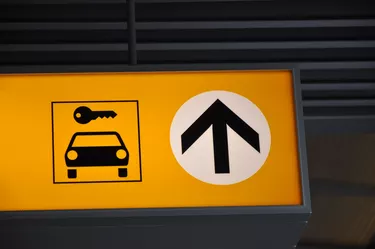
When standing at the rental counter, you're always asked if you want to buy rental car insurance. Depending on the type of coverage you have on your own car, you may not need to buy rental insurance.
But for your own peace of mind, you should contact your insurance agent before you take a trip to check on your own insurance. Your own car insurance policy may be all you need.
Video of the Day
Video of the Day
Rental Car Collision Damage Waiver
When you rent a vehicle, you'll be asked if you want rental car insurance coverage. But technically, this is not insurance. Instead, it's a collision damage waiver (CDW) or loss-damage waiver (LDW). This means that the rental company won't hold you responsible for property damage to the rental car. This would be like collision insurance.
Rental car insurance also has liability coverage with limits. And it will take care of medical bills if you or your passengers are injured.
Personal property is another offered coverage.
Personal Auto Insurance Policy
Although you should call your insurance agent before you rent a car, your own insurance should cover what the rental car insurance coverage does.
If you have full coverage on your personal vehicle, your personal auto insurance policy will provide collision coverage and liability coverage. Your car insurance policy will also provide you with personal injury protection. Medical costs are also covered.
With full coverage comes comprehensive coverage, and this will also carry over to your rental vehicle.
You should double-check with your insurance provider, but usually, a personal car insurance policy will cover a rental car. Although there is coverage, your standard deductible will still apply with a rental car.
Rental Car Insurance Cost
A rental car company charges for rental car insurance coverage by the day. It's broken down into a charge for collision coverage, liability coverage and personal effects coverage.
The average price for rental car insurance coverage is anywhere from $31 to $60 daily.
Although you should call your insurance agent before you rent a car, your own insurance should cover what the rental car insurance coverage does.
Credit Cards Provide Coverage
A credit card company will offer some secondary coverage for your rental car. For instance, although it doesn't provide primary coverage, VISA offers secondary coverage. They can provide reimbursement for deductibles. For this coverage to apply, you must use your VISA for the vehicle's total payment to the rental car company.
There are some credit cards that offer primary insurance. For example, most Chase credit cards offer primary rental insurance. You will need to book and rent your car with a Chase credit card. There are a few no annual fee Chase credit cards that offer rental car insurance. So you will be able to decline the rental car company coverage.
Homeowners Insurance Coverage
Your homeowner's insurance company may provide coverage for personal items that are stolen from your rental vehicle. Check with your insurance agent.
Renters insurance also provides personal effects coverage.
Non-Owner Car Insurance
If you don't have your own car, you probably don't have a personal car insurance policy. So, if you often rent cars, you're spending a lot on rental car insurance. But, even if you don't have your own car, you can still have a personal car insurance policy.
Ask an insurance agent about non-owned car insurance. Non-owned car insurance is typically less expensive than rental car insurance.
Non-owned car insurance covers medical costs and has collision coverage and liability coverage.
Rental Car Insurance
Depending on your personal auto insurance policy, you may not need to purchase rental car insurance. So when you're standing at the rental counter, don't give in to the pressure. Instead, talk to your insurance agent and have the peace of mind knowing you're both covered and saving money.